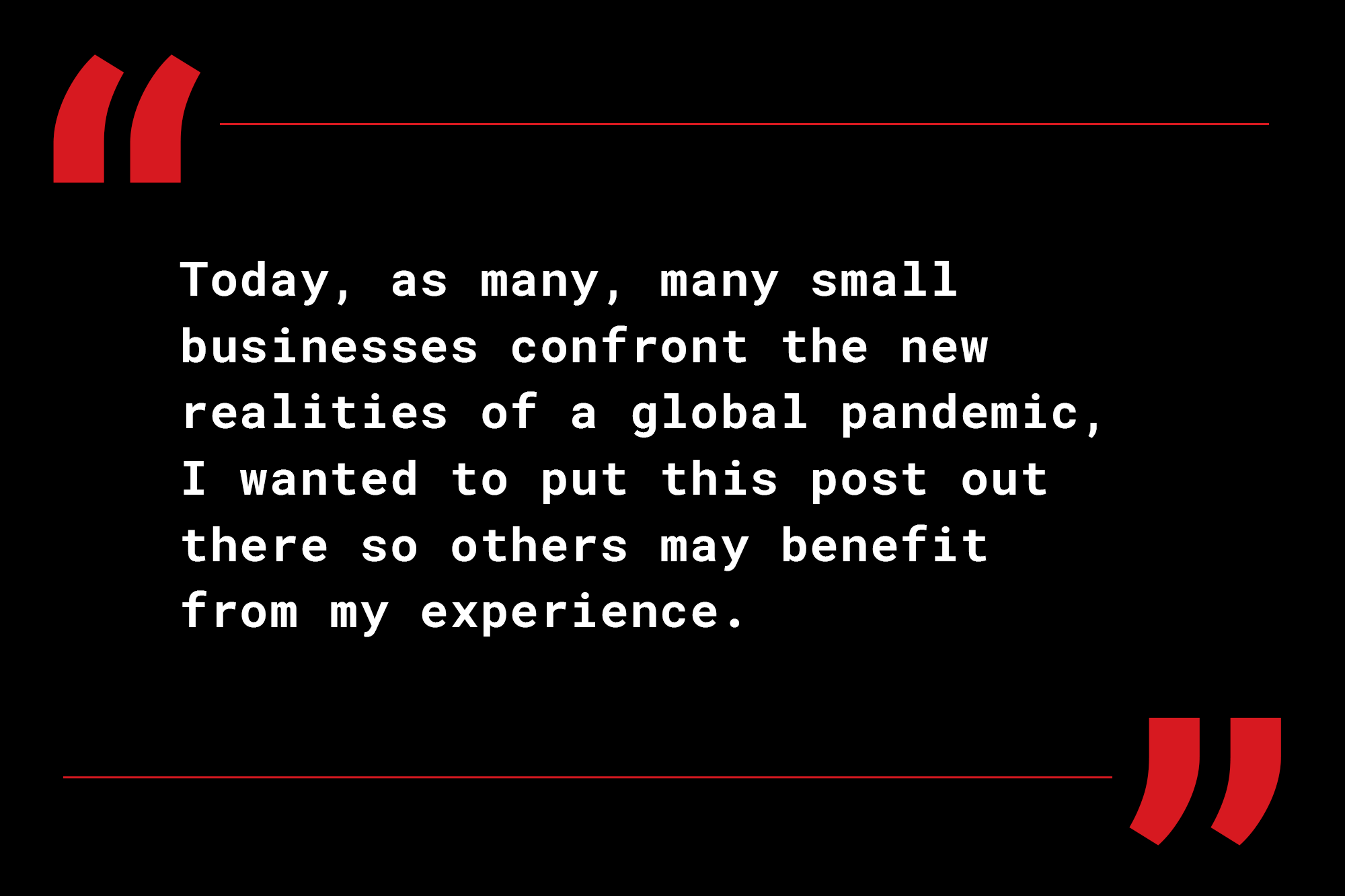Chicken and Rice Guys: Small Business Tips for Handling Crisis
Posted by The Chicken and Rice Guys
View Original Article Here
Back in 2017, my business, Chicken & Rice Guys voluntarily shut down our entire operation for 8 days after e. Coli was traced to our food. Even though we are pretty confident it came from fresh veggies from a former supplier, out of an abundance of caution, we shut down. In the end, the pathogen’s exact origin, as so often’s the case, could not be determined. Before the crisis, we had 120 employees, 5 food trucks and 4 brick + mortar locations. By the end, we had to close a restaurant, lay off dozens of employees, and lost millions of dollars in revenue. Almost 3 years later, while our day to day business is fully recovered, we are still recovering financially from the huge hole we found ourselves in after shuttering our business.
Again, we were closed just 8 days.
The experience has taught me a great deal about managing a small business in times of crisis. Today, as many, many small businesses confront the new realities of a global pandemic, I wanted to put this post out there so others may benefit from my experience.
Covid-19 is scary. It is as contagious as a cold but 10x more lethal than the flu. And while China has contained the virus, let’s not forget they are a socialist country that can mobilize emergency responses faster than America, and they also have less of a transient population and also take in less international visitors for business/education/tourism. In terms of containment I don’t think America will do better or worse than China, just that we can’t compare the two.
As a business owner, there is a lot you can do. Let me break it down into the major areas at which you should be looking, starting with cash flow. Cash flow is everything in a crisis. To improve cash flow, you can make more money, reduce costs, or bring in outside cash flow. Sounds simple, but I’ll share the nuances and tips on the best ways to manage cash flow.
Project and protect your cash flow!
The very first thing you should be doing is updating your cash flow sheet. If you don’t have one, MAKE ONE. It can be as simple as this:

If you need help building this, there are plenty of resources on Google/Youtube. For restaurants it is pretty easy to forecast the revenue/costs. For service providers/more complex businesses, it will be a little more difficult, but you should at least have something.
You want to be updating this every day with your starting bank balance. Adjust projected revenue as much as possible, especially in times of crisis when actual numbers are very volatile. If you immediately start seeing negatives in the “End of Day” column, don’t panic, but get ready to take swift action.
If you are not seeing negatives, you want to also forecast a worst case scenario, and medium worst case scenario. Let’s say the entire city shuts down, and nobody eats out. Change your revenue to zero; see what your cash flow looks like with no sales because, believe me, it can happen. Maybe the city doesn’t shut down, but sales drops 50%, project that too. I know we all feel like we have a grasp of our numbers, but it’s another thing to visualize it and know exactly how many days of shut down/prolonged reduction in sales you can absorb. And remember, your cash flow can die a slow death or an immediate! YOU WANT TO PLAN FOR THE WORST BEFORE IT HAPPENS. THAT’ S WHEN YOU HAVE THE MOST OPTIONS TO FIND LOANS, RAISE MONEY, OR MAKE CHANGES TO THE FINANCIAL STRUCTURE OF YOUR BUSINESS. DO NOT WAIT UNTIL S*HIT HITS THE FAN. If you do, you’ll be forced to take crappy deals either selling equity, or taking on super high interest loans – which I’ll get to next.
How much money should I have saved up?
One question I always ask people is, how much money do you save for a rainy day? Everyone’s answer is different. Microsoft used to carry an entire year’s worth of cash, while many small businesses keep a few payrolls worth of cash to cover expenses. My answer is, save as much money as you can for crises like these (not to mention, those with cash in times of crisis are the ones best positioned to capture good opportunities – see Warren Buffet as an example of someone who hoards cash for times like this)! In very tough times, our bank accounts evaporated to almost nothing, but as long as you are not negative, there is no magic fairy that comes out and puts you out of business. And if it is negative, depending on your bank, you will have the opportunity to get it in the black. That being said, the closer you are to 0, the less sleep you will get and the more stressed you will feel!
How do I get more outside cash?
Best option: Friends & Family
Oftentimes close friends or family will give you good rates, or even let you borrow money out of the kindness of their hearts. While this is the best decision financially, you are putting your relationship at risk. That being said, I have relied on the generosity of many friends to get us through some financially tough times. My tip is to if you have to suspend payments, communicate as much as possible with your friends & family! They will be sympathetic, especially if you are honest with them. Also, see if you can trade your goods or services in order to buy extra time if you have to miss payments. If you are thinking of asking for money, have the conversations as early as possible. No one likes to be asked for money, and then go through the trouble of doing overnight wires etc.
Talk to your bank!
Many times a bank will extend a line of credit, or a loan, both of which will be lower interest than a credit card or online lending. Oftentimes they will want collateral through real estate or a personal guarantee. Every partner over 20% equity will have to sign a personal guarantee, and since every partner probably has a different portfolio of asset/risk tolerance, you need to have this conversation ASAP! We decided not to go this route because of the personal guarantee issue. I have received advice from both sides. Lawyers always tell me not to sign personal guarantees. Vendors and a friend that uses bank loans tell me the vendor/banks will not go after individuals as it’s usually not worth the effort/cost to do so. They will liquidate the assets of the business and leave the person alone. But be careful, even if you don’t have a lot of assets, the legal extent of personal guarantees can allow the person collecting to garnish future wages directly from your W2 or even something like rights to future estate payments. If you do go this route, this is a SLOW option, and in times like this, the bank is inundated with these requests.
Online Lending
I hate recommending this. Often online lenders come with personal guarantees and pretty high APR’s (but generally less than credit cards). Make sure you read the fine print. Every platform is different. Some allow you to pay off the loan early and avoid interest rates, some lock you in. Choose the platform that fits best for you. There are many platforms out there, but the two I have used and would recommend are Square and Kabbage. Square takes a % of daily revenue, and Kabbage takes a monthly payment. A lot of places you would not expect also lend money including Quickbooks and Toast. One plus is you will get the money quickly. This is why I stress the importance of being proactive and knowing your cash flow. If you have time and want to go the bank route, you are looking at an APR in the 0-10% range versus 20%+ for a credit card, which for $100,000 can be the difference of $12,000 a year!
Credit cards
Ugh. I hate this option, but this is your worst and last option. The rates are always going to be highest. Try to find a credit card though that gives you some months to pay back with 0% APR.
Finances: Managing vendor payments
After you have figured out worst case cash flow scenarios and back up plans for cash. You have to start finding ways to either reduce costs, or push out payments. I am going to cover managing payments first. This is where it’s very important to do your cash flow first. First, it will let you know how drastic you need to be, plus it will give you a basis to have a conversation with your vendor. If you just ask to push back payments, that is fine, but if you can give them information into your finances, that will be a much more effective conversation. For example, something like, “Hey I ran my numbers, and we are going to run out of money in 3 weeks if we don’t make fundamental changes, is there anything you can do to help reduce our payments or delay some payments?” or “I have to delay this month’s rent two weeks, but after this it looks like it’s pretty smooth sailing and I can pay things on time”. Two tips here, ALWAYS under promise and over deliver. BE HONEST. The moment your vendor feels you are lying, you will not get a single favor moving forward. YOUR VENDOR CAN BE YOUR BEST FRIEND IN CRISIS. We have an amazing food supplier, and they literally have saved our business – a benefit of paying a premium when dealing with larger businesses is that they are more likely to work with you on finances.
Now, this is my least favorite part of the conversation, but this is business and things can get ugly. If your vendors do not play nice, feel free to not play nice as well. Remember, you too are a customer, and you are valuable to them. Just like you would do a favor for your customer, there should be some leeway from a vendor. And if things devolve, they may take you to small claims court or send you to a collection court. From my experience, nobody wants to go down this road, and there is usually a way to settle things or work out a payment plan that is a win for everyone.
But just like cash flow planning, be proactive and communicate to your vendors, but also to your staff so they know if they are going to have to deal with an unhappy vendor.
Cutting Costs (Non-operational/labor)
Cut any non-essential non-operational costs. Every little bit counts. Penny’s become dollars. Literally go through your credit card and bank statements and nit pick every cent that goes out. Make sure to communicate to the staff of this importance as well. Things they may not have done when things are normal, they will do in times of crisis. Most people will step up and understand the circumstances.
Now to the hard part, making cuts to labor! I would recommend, the very moment you think things could turn for the worst, you have to start taking a look at your labor. This is a moment for honest conversations. Make sure your team understands the headwinds your company faces and give them the opportunity to step up. While I am still incredibly touched by how the CNR family pulled together in our time of crisis, not everyone came aboard. Employees, who frankly weren’t team players when times were good, became anchors weighing down our recovery. Now is the time to ensure your team is fully committed. The earlier you do this, the longer your runway will be. And in times of crisis, it’s all about how long you can kick the can down the road — how long can you keep your cash flow positive.
Layoffs are an unfortunate consequence of a severe crisis, but cutting personnel you want to keep should be your absolute last resort. There are just so many long term costs of laying off an employee. It costs sometimes twice as much as an employees annual salary to recruit, train and give time for that employee to ramp up. So really, a dollar saved here, maybe two dollars down the road. And honestly, if they are a really good employee, maybe three dollars!
You can also ask salaried employees to take pay cuts. We did. I am so grateful of my employees for doing so, and at the time every one of our salaried employees was on board. BUT, it is A LOT to ask, and be prepared to make it back to them twofold. If you do go the pay cut route, in Massachusetts at least, the government will make up some of that wage difference.
This program was a life saver to us! WorkShare
Communication is key!
I have stated this through the article, but want to reiterate: make sure you are communicating promptly and transparently with your teams, your vendors, your customers, and folks that might be loaning you money. Keep them updated on the progress and health of your company. Most of the time our vendors just want to know when they might see payments, and want to make sure we are not going out of business.
Also, even more important, keep your staff updated! Send messages out as often as possible, be transparent, share bad news. If there is key news, send out messages how that news affects the company. Also, be present, and if you cannot, have conversations with your employees and keep them updated on the plans of the company.
Managing Stress
Lastly, the biggest factor in getting through a crisis is YOU. It is important, but now more than ever, take care of yourself mentally. For example, if you are stressing out, it will affect your sleep, which will affect your ability to make good decisions.
Now is the time to do things that reduce stress for you, exercise, yoga, meditation, massage, whatever it is, make time for it. Spend time with loved ones to remind you of the things more important than business! At the end of the day stress is like a rocking chair, it is fun to rock back and forth but ultimately gets you nowhere!
As you can see in this article, there are many things you can do to fight the crisis. But your stress level and energy level are going to dictate how long and how much you want to fight. Take care of yourself, and you will be able to take care of your business!




